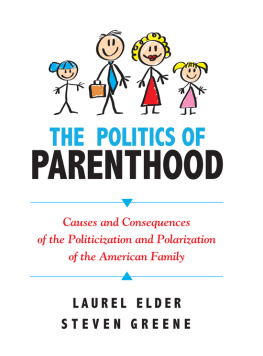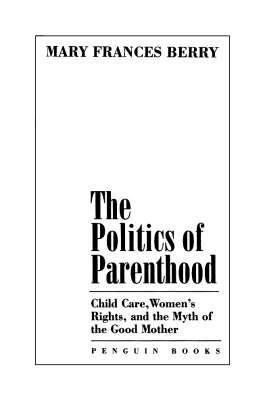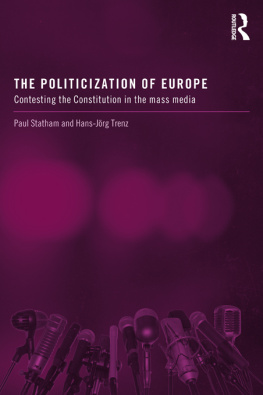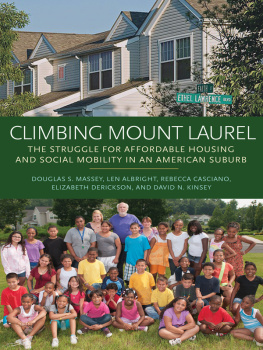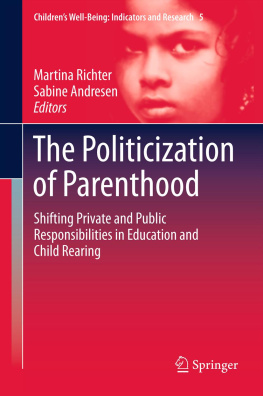The Politics of Parenthood
Causes and Consequences of the Politicization and Polarization of the American Family
Laurel Elder
and
Steven Greene
Cover photo credit: Ryan Burke/iStockphoto.com
Published by State University of New York Press, Albany
2012 State University of New York
All rights reserved
Printed in the United States of America
No part of this book may be used or reproduced in any manner whatsoever without written permission. No part of this book may be stored in a retrieval system or transmitted in any form or by any means including electronic, electrostatic, magnetic tape, mechanical, photocopying, recording, or otherwise without the prior permission in writing of the publisher.
For information, contact State University of New York Press, Albany, NY
www.sunypress.edu
Production by Diane Ganeles
Marketing by Michael Campochiaro
Library of Congress Cataloging-in-Publication Data
Elder, Laurel.
The politics of parenthood : causes and consequences of the politicization and polarization of the American family / Laurel Elder and Steven Greene.
p. cm
Includes bibliographical references and index.
ISBN 978-1-4384-4395-9 (hardcover : alk. paper)
1. ParenthoodUnited States. 2. FamiliesUnited States. 3. Parenthood United StatesPublic opinion. 4. FamiliesUnited StatesPublic opinion. 5. United StatesPolitics and government. I. Greene, Steven. II. Title.
HQ755.8.E367 2012
306.874dc23
2011047985
10 9 8 7 6 5 4 3 2 1
To our parents: Carol and Richard Elder;
Hilde and Robert Greene
Tables and Figures
Tables
Figures
Acknowledgments
A book this long in the making means a lot of people to thank. We definitely need to start with the many friends and mentors in the Ohio State Political Science department, where we began our friendshipif not our collaboration. Paul Beck was the best adviser either of us could ask for in guiding us through our respective dissertations and later provided advice and support for this project. Likewise, Herb Weisberg was a tremendous mentor and adviser to both of us at Ohio State and in the early stages of this research. Other Ohio State faculty: Tom Nelson, Janet Box-Steffensmeier, Dean Lacy, William E. Nelson, Katherine Tate, Kira Sanbonmatsu, Aage Clausen, Gregory Caldeira, Elliot Slotnick, Lawrence Baum, and Samuel Patterson provided great guidance during our time there, as did Retta Semones. Our peers from Ohio State, especially Joe McGarvey, Stefanie Chambers, Jason Pigg, Pedro Magalhes, and Barry Burden also very much deserve recognition for being such supportive friends.
This book has been the result of numerous conference presentations as well as discussions with peers and colleagues. Among those most valuable in shaping and aiding our work, we would like to thank Lois Duke-Whitaker, Craig Brians, Kyle Saunders, Andrew Seligsohn, and Zoe Oxley. We are also grateful to many additional political scientists, too numerous to mention, who provided valuable feedback and insight on our conference papers and journal manuscripts related to this project. The anonymous reviewers, including those for this book, proved especially valuable.
At Hartwick College several students served as excellent research assistants on this project including Jennifer Bezanson 07, Jennifer Lonergan 09, and Caitlin Hill 09. Laurel's father Richard Elder also edited and gave sage advice on several chapters of the book for which we are very grateful. The members of the Political Science Department at Hartwick, both past and present, have not only been wonderful colleagues, but have always been supportive of this research. We are grateful to Hartwick College for providing support for this project, including a Faculty Research Grant. At North Carolina State, members of the School of Public and International Affairs, especially Mike Cobb, Richard Clerkin, Bill Boettcher, Michael Struett, and Charlie Coe were always ready with feedback and support. Two NCSU undergraduates, Mark Yacoub '09 and Elizabeth Ivey '08, were instrumental in our work on chapter four.
Of course, we could not have done this without the help and support of our families and our friends. Laurel is especially grateful for the patience and love of her husband Mike, her daughter Indigo, and her poodle Henry who sat on her lap throughout most of the writing of this book. Laurel would also like to thank Steve who always believed they could finish and publish this book, even when she was not so sure. Steve went from a father of one to a father of four during the course of this project and could not have done it without the support and advice of his wife Kim. It is obligatory to thank your family for all the time away while you were working on the book. In this case, that's not necessary, which is why this book took so long. He would be remiss, though, not to acknowledge the four who make this title especially relevant to him and so slowed his progress: David, Alex, Evan, and Sarah.
At SUNY Press we would especially like to thank Michael Rinella who always believed in this project and stuck with us longer than we deserved. The rest of SUNY Press has been a model of professionalism in bringing this book to press.
Finally, we wish to thank our parents, to whom we dedicate this book, for love and support and encouraging our own love of politics.
Parenthood Is Political
This book is an exploration into how parenthood and the family have become politicized in American politics. Despite the centrality of raising children in the lives of many voters, and despite the emergence and prominence of topics concerning parents and the family within the national political debate, parenthood has not been a central focus in political science scholarship. There are very few acts more personal and intense in life than raising children. In this book we show how this very personal and intense act of raising a family is a politically defining experience and has come front and center into the political debate.
The central argument of this book is that parenthood is political. The transition to parenthood introduces dramatic and long-term changes into the lives of adults. Becoming a parent and raising children are significant adult socialization experiences, which, like getting married, entering the workforce, or growing older, hold the potential to shape political priorities, attitudes, and behavior. Over the last half century, the social and political environment surrounding America's families has changed in ways that have intensified the parenting experience and the importance of the family in national political debates.
The structure of the American family changed dramatically since the 1950s. Traditional nuclear families, in which fathers take on the role of economic provider while mothers care for the home and the children, are no longer the dominant family structure. The number of single-parent families has increased, and they now represent about one-third of all households with children. Additionally, parents of both sexes are working longer hours to support their families and cover the costs associated with raising children. This is especially true for mothers, the majority of whom, whether unmarried or married, are now seeking to balance work outside the home with their continued roles as the primary care-givers for their children.
Despite these increased work hours and the demands of contemporary life, surveys reveal that parents place high value on their parental roles and identities, and detailed time diaries document that parents are spending as much and in many cases more time with their children than their parents and grandparents did ().

